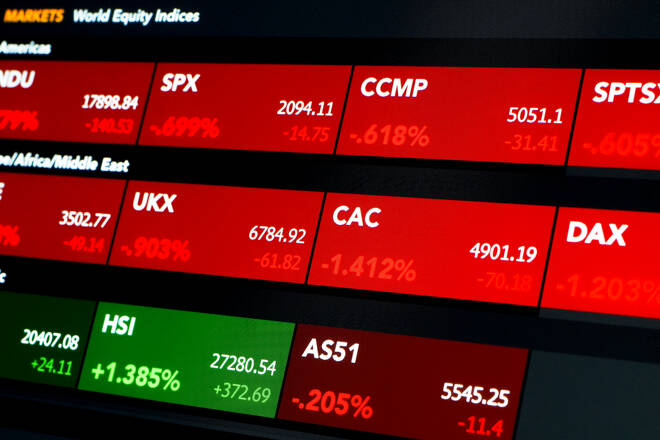Advertisement
Advertisement
European Equities: Economic Data, the FED, and Russia in Focus
By:
Following Monday's rout, a late recovery across the U.S majors should deliver early support to the European majors.
Economic Calendar
Tuesday, 25th January
German IFO Business Climate Index (Jan)
Wednesday’ 26th January
France Jobseekers Total
Thursday, 27th January
GfK German Consumer Climate (Feb)
Friday, 28th January
French Consumer Spending (MoM) (Dec)
French GDP (QoQ) (Q4)
Spanish GDP (QoQ) (Q4)
German GDP (QoQ) (Q4)
German GDP (YoY) (Q4)
The Majors
It was a particularly bearish start to the week for the European majors on Monday. The CAC40 slid by 3.97%, with the DAX and the EuroStoxx600 ending the day with losses of 3.80% and 3.81% respectively.
Economic data was on the busier side, with private sector PMIs from Europe and the U.S in focus through the session. While German private sector activity rebounded in January, Eurozone private sector growth slowed to an 11-month low, which was market negative.
Market jitters ahead of this week’s FOMC monetary policy decision and forward guidance ultimately sank the majors, however. Adding to the market angst was the rising threat of Russia attacking on the Ukraine.
The Stats
It was a busy day on the Eurozone economic calendar. Prelim January private sector PMIs for France, Germany, and the Eurozone were in focus.
Member States
In January, France’s manufacturing PMI fell from 55.6 to 55.5, with the services PMI declining from 57.0 to 53.1. Economists had forecast PMIs of 55.5 and 55.3 respectively.
Germany’s manufacturing PMI jumped from 57.4 to 60.5, with the services PMI rising from 48.7 to 52.2. Economists had forecast PMIs of 57.0 and 48.0 respectively.
The Eurozone
According to prelim figures, the Eurozone’s manufacturing PMI rose from 58.0 to 59.0, while the services PMI fell from 53.1 to 9-month low 51.2. Economists had forecast PMIs of 57.5 and 52.2 respectively. The manufacturing PMI hit a 5-month high, supported by the jump in German manufacturing sector activity.
As a result, the Composite PMI declined from 53.1 to an 11-month low 52.4 versus a forecast of 52.6.
According to the January prelim survey,
- Renewed COVID-19 restrictions weighed on the services sector, while an easing to supply chain bottlenecks supported the manufacturing sector.
- Tourism and recreation activity fell at a rate not seen since last February.
- While consumer facing industries struggled, other business service providers and financial services firms reported solid growth.
- For the manufacturing sector, supply constraints eased, offsetting staffing issues that curbed output.
- New orders continued to rise through at the slowest pace since last March. For goods, however, new orders increased to the greatest extent since August.
- Manufacturing jobs growth hit the highest level since last July and close to all-time highs.
- Inflationary pressures persisted, however. Average selling prices across the private sector matched November’s all-time high.
- Sentiment improved marginally, driven by optimism across the manufacturing sector.
From the U.S
Prelim private sector PMIs were also in focus. In December, the U.S manufacturing PMI fell from 57.7 to 55.0, with the services PMI sliding from 57.6 to 50.9. As a result, the Composite PMI slipped from 57.0 to 50.8.
The Market Movers
For the DAX: It was a bearish day for the auto sector on Monday. Volkswagen slumped by 5.92%, with Continental and Daimler sliding by 4.79% and by 5.05% respectively. BMW ended the day down by 4.27%.
It was also a bearish day for the banks. Deutsche Bank tumbled by 6.26%, with Commerzbank falling by 3.67%.
From the CAC, it was a bearish day for the banks. Soc Gen slid by 5.60%, with Credit Agricole and BNP Paribas falling by 3.18% and by 3.75% respectively.
The French auto sector had yet another bearish session. Stellantis NV slumped by 5.39%, with Renault ending the day down by 2.81%.
Air France-KLM and Airbus SE fell by 3.12% and by 3.36% respectively.
On the VIX Index
It was a 5th consecutive day in the green for the VIX on Monday.
Following a 12.74% jump on Friday, the VIX rose by 3.64% to end the day at 29.90. The VIX had struck a day high 38.94 before a late U.S market rebound.
The NASDAQ rose by 0.63%, with the Dow and the S&P500 seeing gains of 0.29% and 0.28% respectively.
The Day Ahead
It’s another busy day ahead on the Eurozone’s economic calendar. Early in the European session, German business sentiment figures will be in focus. While we expect the headline Ifo Business Climate Index figure to be the key driver, the expectations sub-index will also influence.
Late in the European session, U.S consumer confidence figures for January will also draw plenty of attention.
With the FOMC monetary policy meeting kicking of today, however, we can expect market jitters over inflation and interest rates to linger.
For a look at all of today’s economic events, check out our economic calendar.
About the Author
Bob Masonauthor
With over 28 years of experience in the financial industry, Bob has worked with various global rating agencies and multinational banks. Currently he is covering currencies, commodities, alternative asset classes and global equities, focusing mostly on European and Asian markets.
Advertisement
